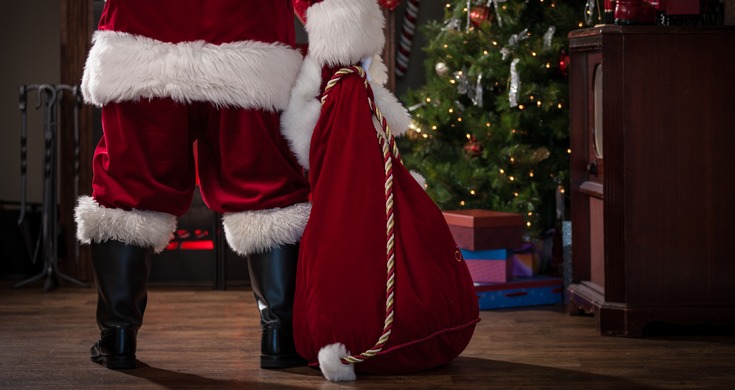So much of what we love about this time of year is the child-like magical nature of Christmastime and the winter holidays. All the lights, decorations, presents, delicious food, and time with family paint a picture of enchanted celebrations that we cherish long into our adult lives. For most, Santa Claus plays a significant role in these memories—that is, until the day we remember finding out…the truth.
There are varying ends of the spectrum of this debate, but whether or not parents should encourage their children to believe in Santa has been long deliberated. Recently, this discussion made news when a substitute teacher told a classroom of first graders that Santa isn’t real—and neither are the Tooth Fairy or Easter Bunny. Clearly, this is not a conversation that should have occurred in a classroom, but there are many questions in parenting and psychologist circles about the harm or benefit to kids of believing in Santa Claus.
According to an AP poll, 84 percent of people surveyed believed in Santa Claus as a child. With that being a significant portion of us, every parent is left facing the dilemma of whether and/or when to tell their children the truth about Santa.
Why It’s Good for Kids to Believe in Santa
Looking beyond the fun aspects of having a jolly old giver of presents, Santa can provide for children an avenue for fantastical imagination. Parenting columnist Melinda Wenner Moyer encourages belief by saying, “Fantasy play forces kids to think through hypothetical or counterfactual scenarios, which bolsters their reasoning skills.” As kids rationalize Santa in their minds, they’re engaging in and sharpening their critical thinking. Although, it can be argued that imagination and creativity are more effectively applied when the object is known to be pretend or fictional rather than understood and believed as real.
In a world where kids are facing countless stressors, hectic schedules, and traumatizing events, having something good for them to focus on around the holidays can provide a glimmer of joy in a perhaps otherwise dismal environment. Dr. Moyer with the University of New England asks, “Might it be the case that the harshness of real life requires the creation of something better, something to believe in, something to hope for in the future?” If believing that someone cares enough to take note of them and their good behavior and then flies around the earth to arrive at their home to give them a gift makes even just one child smile at Christmas, then maybe it’s all worth it.
The Potential Harm in Having Kids Believe in Santa
However, many experts state that in fact it’s not worth it. They believe that the distrust that is built within kids upon discovering their parents lied to them causes much more harm than any good the initial lie may have provided. Psychologist and parenting expert Dr. Justin Coulson states, “Research shows that kids who are lied to by their parents are more likely to lie themselves.” In the minds of children, they begin questioning any truths told by their parents as clinical psychologist Kathy McKay warns, “If parents can lie so convincingly and over such a long time, what else can they lie about?”
Additionally, the extrinsic behavior motivation that comes from avoiding Santa’s naughty list at Christmas can create a discipline nightmare for parents. If children become accustomed to only exhibiting good behavior when or because there is a reward, then the habit of behaving because it’s simply the right thing to do can become increasingly less instinctive for some children. They will potentially become reliant on these external motivators, and discipline will be replaced with bribery.
What’s the Answer to the Santa Claus Debate?
We get wrapped up in the emotion behind such movies as The Polar Express and Yes, Virginia, There Is a Santa Claus, and many of us earnestly want our kids to believe in Santa for as long as possible. Whether it is out of our own desperate desire to return to the fantastical innocence of childhood or out of our love for our kids and wanting them to experience the magic of Christmas, the tendency is to err on the side of convincing our children to believe in Santa.
I am an exception to this, as I have never focused on telling my kids that Santa is real. Well, I told them there was a St. Nicholas known as a protector of children who generously gave to the unfortunate, and this spirit of kindness is what people hold on to and why they teach their children that Santa is still alive today. I explained to them that the man himself is no longer alive, though, and that the Santa Clauses they see today are people dressed up in celebration and as a reminder of the generosity of St. Nicholas.

This story is proof that obviously every family must be careful in what they say and how they approach Santa Claus with their kids. So many are “believers,” and for those of us teaching our kids the truth about Santa from the start, we must be mindful of other children and families who are choosing to keep the belief in Santa alive and well. Never should we be the ones to reveal the truth, and we should be careful about what our kids say around others.
As with so many parenting decisions, every family must consider their own dynamics, beliefs, and traditions when making decisions of whether or not to encourage kids to believe in Santa. Taking into consideration what many experts are saying, perhaps some modifications should be made to how Santa is presented to children. However, one thing remains true—children should always be encouraged to focus on giving to others and understanding that the holiday season is about much more than simply how many presents are under the tree.





































